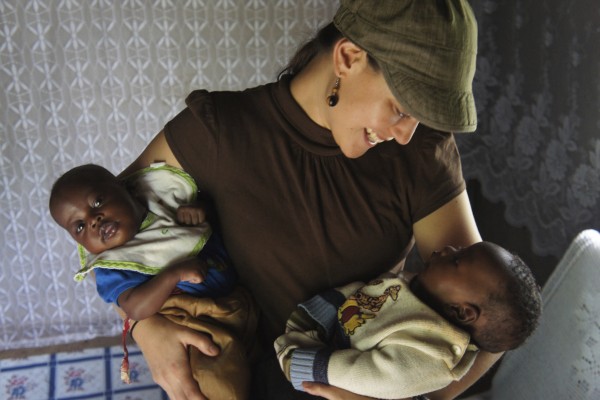I greeted Saturday morning with a bad attitude. My alarm went off at 5:15a, just 25 minutes after I had gone back to bed after nursing Jude. I threw my bags together and hustled out the door to join the Jars guys in a van with a trailer, headed for Atlanta.
We had a benefit concert that night, and I was slated to make the pitch from stage. Though I speak in front of people frequently, I still feel anxious and ill-prepared for such a task. It had been a long week, and I just wanted to spend my Saturday morning curled up on the couch with my baby and my husband.
The goal for the night was to raise $10,000 - enough money to provide a well for a community in Zambia. With an expected audience of 1000, I planned to ask each person to consider donating $10. It seemed a simple way to get there, not asking too much of anyone.
But when the opening act began, the auditorium was pretty empty.
Like awkward empty.

Like this was supposed to be the most happening place on a Saturday night, but you were duped because everyone apparently went somewhere else kind of empty.
I felt duped, too.
"We can't ask for a well tonight," I told my colleague Jake. We'd be asking for too much. Reluctantly, I walked on the stage and told the scattered crowd about a community called Koloko, in Zambia.
I pulled these photos up, for the audience to see. They were taken that day by our team in Zambia.
There's Josh rolling the drum of water.

Community members use this to transport their water, over 2.5 miles away from their homes.
There's Courtney, accompanying a mama and her child on the walk for water.

Children under the age of 5 are dying unnecessarily from water-borne illnesses.
And here's the dream, I told them: that walking miles for water would no longer be necessary, that preventable diseases and deaths would disappear. A well could help them do that.

Despite the fact that I knew we wouldn't get the full $10,000 that we needed that night, I boldly asked the audience that we try.
So we passed the popcorn buckets through the aisles, and people placed dollar bills into the buckets. It was a beautiful sign of generosity.
But it wasn't going to be enough.
Until a man pulled me aside and handed me a blank check to get us to the $10,000.
A blank check.
In ten years of asking for money on behalf of my friends in Africa, I have never been given a blank check. It was a shower of mercy for my doubtful heart. A lifetime of water for a community we love.
It's moments like these where my narrow worldview continues to change because it's not about the thousands or the crowds or being in the hippest place on a Saturday night. It's not about demanding a guarantee of success before giving up a precious day for myself.
It's about remembering that God is bigger than our wildest dreams. That sometimes you don't need a thousand new supporters; but rather, just the faithful ones. It's about the stories we tell. And the faithful actions we live out despite our unbelief.
I guess, too, it's about being bold enough to ask, even when it feels foolish. And it's about letting love surprise you - because when I went back on stage to announce the good news, my colleague Michael ran up to tell me that another person had just donated $10,000.
And just like that, this small but mighty crowd had done something extraordinary. Koloko was now bound up in us, and us in them. But we had to have the audacity to ask. My own doubtful heart turned upside down.


 When I was in high school, I was voted most likely to devote my life to a lost cause. I was mildly offended, but ultimately took it as a compliment.
When I was in high school, I was voted most likely to devote my life to a lost cause. I was mildly offended, but ultimately took it as a compliment. 



